|
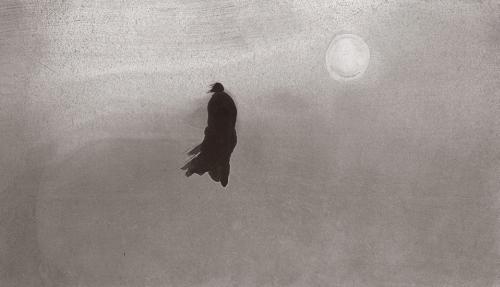 Moon and Wind
Layers of Light, Ink in Mind
Gao Xingjian
via arsvitaest
_______________________
Lessness
A Story by Samuel Beckett
b. April 13, 1906
Ruins true refuge long last towards which so many false time out of mind. All sides endlessness earth sky as one no sound no stir. Grey face two pale blue little body heart beating only up right. Blacked out fallen open four walls over backwards true refuge issueless.
Scattered ruins same grey as the sand ash grey true refuge. Four square all light sheer white blank planes all gone from mind. Never was but grey air timeless no sound figment the passing light. No sound no stir ash grey sky mirrored earth mirrored sky. Never but this changelessness dream the passing hour.
He will curse God again as in the blessed days face to the open sky the passing deluge. Little body grey face features slit and little holes two pale blue. Blank mind.
Figment light never was but grey air timeless no sound. Blank planes touch close sheer white all gone from mind. Little body ash grey locked rigid heart beating face to endlessness. On him will rain again as in the blessed days of blue the passing cloud. Four square true refuge long last four walls over backwards no sound.
Grey sky no cloud no sound no stir earth ash grey sand. Little body same grey as the earth sky ruins only upright. Ash grey all sides earth sky as one all sides endlessness.
He will stir in the sand there will be stir in the sky the air the sand. Never but in dream the happy dream only one time to serve. Little body little block heart beating ash grey only upright. Earth sky as one all sides endlessness little body only upright. In the sand no hold one step more in the endlessness he will make it. No sound not a breath same grey all sides earth sky body ruins.
Slow black with ruin true refuge four walls over backwards no sound. Legs a single block arms fast to sides little body face to endlessness. Never but in vanished dream the passing hour long short. Only upright little body grey smooth no relief a few holes. One step in the ruins in the sand on his back in the endlessness he will make it. Never but dream the days and nights made of dreams of other nights better days. He will live again the, space of a step it will be day and night planes sheer white eye calm long last all gone from again over him the endlessness.
In four split asunder over backwards true refuge issueless scattered ruins. Little body little block genitals overrun arse a single block grey crack overrun. True refuge long last issueless scattered down four walls over backwards no sound. All sides endlessness earth sky as one no stir not a breath. Blank planes sheer white calm eye light of reason all gone from mind. Scattered ruins ash grey all sides true refuge long last issueless.
Ash grey little body only upright heart beating face to endlessness. Old love new love as in the blessed days unhappiness will reign again. Earth sand same grey as the air sky ruins body fine ash grey sand. Light refuge sheer white blank planes all gone from mind.
Flatness endless little body only upright same grey all sides earth sky body ruins. Face to white calm touch close eye calm long last all gone from mind. One step more one alone all alone in the sand no hold he will make it.
Blacked out fallen open true refuge issueless towards which so many false time out of mind. Never but silence such that in imagination this wild laughter these cries. Head through calm eye all light white calm all gone from mind. Figment dawn dispeller of figments and the other called dusk.
He will go on his back face to the sky open again over him the ruins the sand the endlessness. Grey air timeless earth sky as one same grey as the ruins flatness endless. It will be day and night again over him the endlessness the air heart will beat again. True refuge long last scattered ruins same grey as the sand.
...(more)
_______________________

Light Sea Mood
1901
Emil Nolde
d. April 13, 1956
_______________________
Esthétique du Mal
Wallace Stevens
(....)
XI
Life is a bitter aspic. We are not
At the centre of a diamond. At dawn,
The paratroopers fall and as they fall
They mow the lawn. A vessel sinks in waves
Of people, as big-bell billows from its bell
Bell-bellow in the village steeple. Violets,
Great tufts, spring up from buried houses
Of poor, dishonest people, for whom the steeple,
Long since, rang out farewell, farewell, farewell.
Natives of poverty, children of malheur,
The gaiety of language is our seigneur.
A man of bitter appetite despises
A well-made scene in which paratroopers
Select adieux; and he despises this:
A ship that rolls on a confected ocean,
The weather pink, the wind in motion; and this:
A steeple that tip-tops the classic sun's
Arrangements; and the violets' exhumo.
The tongue caresses these exacerbations.
They press it as epicure, distinguishing
Themselves from its essential savor,
Like hunger that feeds on its own hungriness.
(....)
XV
The greatest poverty is not to live
In a physical world, to feel that one's desire
Is too difficult to tell from despair. Perhaps,
After death, the non-physical people, in paradise,
Itself non-physical, may, by chance, observe
The green corn gleaming and experience
The minor of what we feel. The adventurer
In humanity has not conceived of a race
Completely physical in a physical world.
The green corn gleams and the metaphysicals
Lie sprawling in majors of the August heat,
The rotund emotions, paradise unknown.
This is the thesis scrivened in delight,
The reverberating psalm, the right chorale.
One might have thought of sight, but who could think
Of what it sees, for all the ill it sees?
Speech found the ear, for all the evil sound,
But the dark italics it could not propound,
And out of what one sees and hears and out
Of what one feels, who could have thought to make
So many selves, so many sensuous worlds,
As if the air, the mid-day air, was swarming
With the metaphysical changes that occur
Merely in living as and where we live.
(....) ...(more)
_______________________

Mountain Slope over the Sea
Emil Nolde
(c1950)
_______________________
Feeling Thinking
David Baker
New England Review
(....)
... in his finest poems, and in the majority of his poems, Stevens exercises his favorite rhetorical method: not doing philosophy, but rather meditating on things and ideas. He notes some dissatisfaction with meditation, as in "Esthetique du Mal," citing his desire to "express what meditation never quite achieved." But to me he is most truly a meditative poet. Let's say his Imagist poems hover, static, halted. And let's say that to speculate is to drive forward, with determination, a destination in mind. Then to meditate is to amble. Meditation is an open-ended gambit to see less where one ends up than what one notices along the way. It is an amusement, a kind of Emersonian circle-observing, orbiting, musing and amused by "this vast ebb of a vast flow": Stevens as transparent eyeball, observing, as John Koethe calls it, "the movements of consciousness." Think of him walking home from work at Hartford Indemnity. In fact, Roger S. Gilbert treats this meditative aspect of Stevens with this same trope: the meditative "walk," not as a narrative subject but rather its occasion, "the experience out of which the poem seems to arise and of which it is itself a part."
...(more)
_______________________
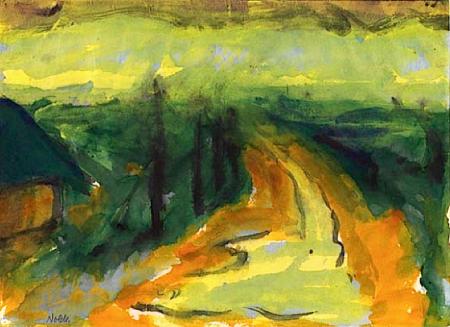
Marschlandschaft
Emil Nolde
1920
_______________________
Texts for Nothing #4
Samuel Beckett
... And all these things, what things, all about me, I won't deny them any more, there's no sense in that any more. If it's nature perhaps it's trees and birds, they go together, water and air, so that all may go on, I don t need to know the details, perhaps I'm sitting under a palm. Or it's a room, with furniture, all that's required to make life comfortable, dark, because of the wall outside the window. What am I doing, talking, having my figments talk, it can only be me. Spells of silence too, when I listen, and hear the local sounds, the world sounds, see what an effort I make, to be reasonable. There's my life, why not, it is one, if you like, if you must, I don't say no, this evening. There has to be one, it seems, once there is speech, no need of a story, a story is not compulsory, just a life, that's the mistake I made, one of the mistakes, to have wanted a story for myself, whereas life alone is enough. I'm making progress, it was time, I'll learn to keep my foul mouth shut before I'm done, if nothing foreseen crops up. But he who somehow comes and goes, unaided from place to place, even though nothing happens to him, true, what of him? I stay here, sitting, if I'm sitting, often I feel sitting, sometimes standing, it's one or the other, or lying down, there's another possibility, often I feel lying down, it's one of the three, or kneeling. What counts is to be in the world, the posture is immaterial, so long as one is on earth. To breathe is all that is required, there is no obligation to ramble, or receive company, you may even believe yourself dead on condition you make no bones about it, what more liberal regimen could be imagined, I don't know, I don't imagine. No pomt under such circumstances in saying I am somewhere else, someone else, such as I am I have all I need to hand, for to do what, I don't know, all I have to do, there I am on my own again at last, what a relief that must be. Yes, there are moments, like this moment, when I seem almost restored to the feasible. Then it goes, all goes, and I'm far again, with a far story again, I wait for me afar for my story to begin, to end, and again this voice cannot be mine. That's where I'd go, if I could go, that's who I'd be, if I could be. ...(more)
_______________________
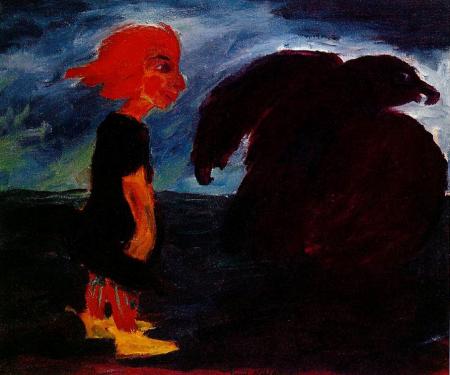 Child and Large Bird
Emil Nolde
1912

photo - mw
_______________________
Afterword: The Death Of The Translator
George Szirtes
the white review
(....)
3.
The translator was looking down his own throat. Come out, come out, wherever you are! he pleaded.
The translator’s wardrobe was full of other people’s shirts. At least they fitted him.
The translator stood in front of the window pretending to be transparent.
But if everything is potentially everything else, complained the translator, what am I doing here?
The translator was counting his chickens, none of them hatched but already squabbling.
4.
The translator wanders into Babel and books himself into a cupboard.
Two languages on the same floor of Babel. – I was here first. – I’m not talking to you. – Keep the music down. – You call that music?
But the gardens of Babel? Who talks about them? Who planted them? Who tended them? cried the translator in his cups, slurring his words.
...(more)
_______________________
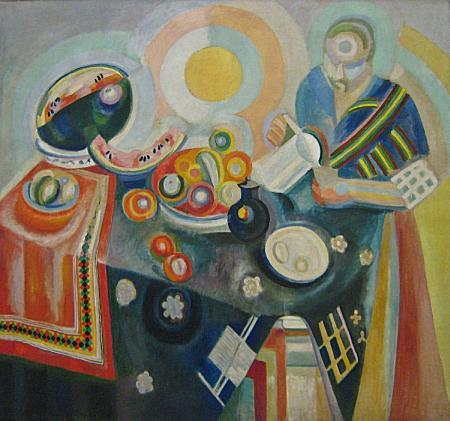
La verseuse
1916
Robert Delaunay
b. April 12, 1885
_______________________
Celan Reads Japanese
Yoko Tawada
translated by Susan Bernofsky
the white review
THERE ARE SOME WHO CLAIM THAT ‘GOOD’ LITERATURE IS ACTUALLY untranslatable. Before I could read German, I found this thought comforting because I was completely unable to appreciate German literature, particularly the literature of the postwar period. I thought I should just learn German and read these works in the original and then my problem with German literature would evaporate of its own accord.
There were exceptions, though, such as the poems of Paul Celan, which I found utterly fascinating even in Japanese translation. From time to time it occurred to me to wonder whether his poems might not be lacking in quality since they were translatable. When I ask about a work’s ‘translatability,’ I don’t mean whether a perfect copy of a poem can exist in a foreign language, but whether its translation can itself be a work of literature. Besides, it would be insufficient if I were to say that Celan’s poems were translatable. Rather, I had the feeling that they were peering into Japanese.
After I had learned to read German literature in the original, I realised that my impression hadn’t been illusory. I was occupied even more than before by the question of why Celan’s poems were able to reach another world that lay outside the German language. There must be a chasm between languages into which all words tumble.
...(more)
_______________________
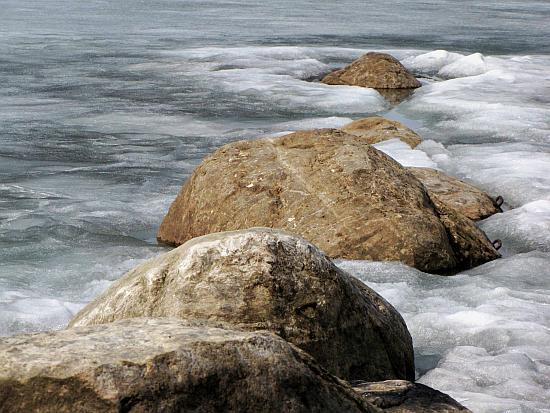
photo - mw
_______________________
Paul Celan and the Meaning of Language
An Interview with Pierre Joris
flashpoint
(....)
I do not choose a particular manner in which to transform Celan. If I have one specific rule mind it is to stay as close as possible to the original, to remain as literal as possible in my translations of Paul Celan. So-called “free translation” or adaptation or “imitations” have most often felt like rip off to me. I.e. misusing, abusing the great dead poet to further the translating poet’s own agenda. Getting a free ride on the shoulders of a giant, so to say. Take for example Robert Lowell's “imitations:” they turn the visionary elements of a Rimbaud poem into a vehicle for Lowell’s minor neuroses. A case of inverse alchemy: gold into lead. There is no free translation just as there is no free verse. As a translator you are responsible for another poet’s work –and that's serious business.
(....)
I do not choose a particular manner in which to transform Celan. If I have one specific rule mind it is to stay as close as possible to the original, to remain as literal as possible in my translations of Paul Celan. So-called “free translation” or adaptation or “imitations” have most often felt like rip off to me. I.e. misusing, abusing the great dead poet to further the translating poet’s own agenda. Getting a free ride on the shoulders of a giant, so to say. Take for example Robert Lowell's “imitations:” they turn the visionary elements of a Rimbaud poem into a vehicle for Lowell’s minor neuroses. A case of inverse alchemy: gold into lead. There is no free translation just as there is no free verse. As a translator you are responsible for another poet’s work –and that's serious business.
I started translating Celan in 1968 and have kept doing so ever since. At some level it has been apprentice work: as a young poet I made the decision to apprentice myself to the man I consider the greatest European poet of the second part of the 20 century. Having shortly before that date decided to become a poet writing in English, or rather American, this work was both a way of discovering how very complex poetry works and of learning how English works at a range of prosodic levels. It also taught me something about the limits of English (or of any language). In that sense Hölderlin’s ideas on translation became important in that I felt that to carry Celan over into English I often had to do violence to English i.e. to write German in English, just as Hölderlin had written “Greek in German.” This is one of the most important aspects of translation: it has to expand, to widen the possibilities of the target language; it is not meant to simply squeeze what is squeezable from the original language into the canonical forms of that language. I hate nothing more than that supposedly laudatory phrase you usually see in a New York Times type book review, usually dismissing translation with the to me lethal compliment according to which “this book reads as if it had been written in English”.
Such translation that makes the original language disappear is an act of what I want to call an underhanded substitution, or, more theoretically, a near-Hegelian Aufhebung or sublation of the original, and corresponds to an act of colonization of the original language/culture — you could even describe it as a kidnapping, or an act of voluntary, conscious or unconscious, destruction. This we need to think about when translating into American English at this imperialist historical moment when the US is trying hegemonically to impose its political, economic & thus cultural values on a major part of the world. Ammiel Alcalay & I have been thinking for awhile now about this — wondering if translating the so-called great works or masterpieces of a foreign culture into English doesn’t simply rob them of their own cultural context… but that’s another discussion.
...(more)
_______________________
Darkness—Translation—Migration
Don Mee Choi
(....)
For Kim (Hyesoon), in the realm of abandonment, is where, in the pre-modern period, Korean women, blurred the boundary between life and death—“that to live is to die and to die is to live,” and, under patriarchy, “that to die is better than to live.” For Kim, the overlapping space of life and death, real and unreal, was necessary “in order to express their problematic identities…fabricate images of their space and…pull out the voices of their transformed selves.” This is why, under South Korea’s patriarchal-neocolonial-neoliberal rule, Kim “take[s] the readers and stand[s] them in front of the gap of the world, the crevice of death.”
The darkness gives birth, nurtures, and gives birth again… Paridegi’s Buddhist Elysium is this black mirror… I, a woman poet, on the road of darkness, the endless road of the text… I break and break apart the darkness I have entered. This is how I can leave here and return to the place I had left.
—from Princess Abandoned
My encounter with Kim’s darkness is what triggered my journey from light back to darkness. Have you ever encountered a mirror like your own in darkness? It “is empty…at the very bottom.” This is why I say I am a lowly translator. Darkness to darkness, wound to wound, mirror to mirror, translation weaves. ...(more)
_______________________

Springtime in the Village
1917
Daniel Garber
b. April 11, 1880
_______________________
Who owns the earth?
Private land ownership is a beautiful dream gone badly wrong. It’s time to reinstate the forgotten ideal of the commons
Antonia Malchik
aeon
(....)
We live on and in the commons, even if we don’t recognise it as such. Every time we take a breath, we’re drawing from the commons. Every time we walk down a road we’re using the commons. Every time we sit in the sunshine or shelter from the rain, listen to birdsong or shut our windows against the stench from a nearby oil refinery, we are engaging with the commons. But we have forgotten the critical role that the commons play in our existence. The commons make life possible. Beyond that, they make private property possible. When the commons become degraded or destroyed, enjoyment and use of private property become untenable. A Montana rancher could own ten thousand acres and still be dependent on the health of the commons. Neither a gated community nor high-rise penthouse apartments can close a human being from the wider world that we all rely on.
We have been able to ignore and damage the commons without acknowledging the consequences for far too long. But now, the press of human population and the rise of industrialism make the question urgent: how will we own our shared resources? How will we protect them for the benefit of all? There are no more frontiers to run away to, and no more pretending that what we do on one piece of property has no effect not only on neighbours next door but on ecosystems hundreds of miles away. In my great-great-grandparents’ time, a driving question for European immigrants or descendants was how to gain the freedom granted by private property. For our future, it’s not just a question of who owns the earth, but how.
...(more)

Melting Snow at Wormingford
John Nash
b. April 11, 1893
_______________________
Gratitude
Alphonso Lingis
Tupelo Quarterly
Gratitude is an action. Giving thanks. When someone arrives with a bottle of wine, we look at its color in the candlelight, savor its perfume, pour its ruby flow into our best glasses, give one to each of our guests before we fill our glass. When someone gives us a gift, we do not just put it on a shelf and sit down to talk about whatever. We receive the gift, it takes time, we take it with both hands, take it in with our eyes, turn it about, contemplate its features. And we show it, share it with others.
Thought is about data, about some things or events that are given; thought comprehends, takes in, what is given, ponders it, feels its weight; thought produces words that are understandable and open to others, that exist for others. Thought is gratitude.
Bristle-thighed Curlews fly 10,000 kilometers from Alaska to Polynesia, flying 3200 kilometers nonstop over the Pacific. Bar-tailed Godwits that were equipped with transmitters flew 11,026 kilometers non-stop from New Zealand to the Yellow Sea in China. Arctic Terns fly the whole extent of the globe, a round trip of 25-34,000 kilometers, seasonally moving from the Artic to the Antarctic, enjoying more sunlight that any other biological species.
Green turtles Chelonia mydas feed of the coast of Brazil and nest on Ascension Island, a speck of land five miles in diameter more than 2200 kilometers away.
Small bands of humans entered the American hemisphere archaeologists think some 17,000 years ago. In Los Toldos cave in the far south of Patagonia, stone tools have been found that date back 12,500 years. Small bands of humans, passing beaches, mountain valleys, prairies, temperate and tropical forests, deserts, walked on foot or sailed in small boats southward more than 20,000 miles until they could go no further.
The word “trip” designates traversing distance between two points but the emphasis is on the destination. A trip to the post office, to Cleveland, one traverses the distance in the fastest or cheapest way.
In the words “trek,” “voyage,” and “travel” the emphasis tends to be on the movement itself and the sights, events, discoveries, mishaps that appear while one is moving. Any destination, any stopping place is constricting, is seeing the same scenery and people and doing the same work every day. Travel engenders wonder and passion.
...(more)
via synthetic zero
_______________________
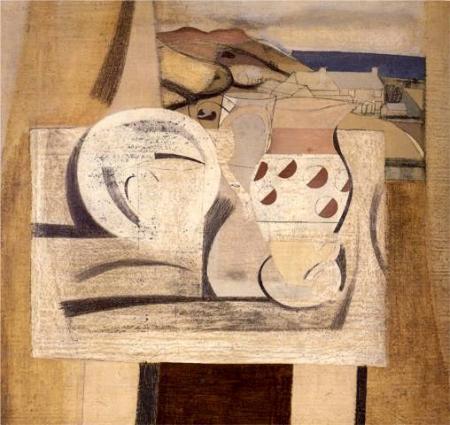
Ben Nicholson
b. April 10, 1894
_______________________
Estuary
Pura López Colomé
Translated by Dan Bellm
—with music by David Wood
I. Leagues away from languages
At two leagues, two tongues,
a sudden romp of otters,
seals, sea lions, herons
in wakeful sleep, sweetenings.
Name on the skin, ethereal skin,
muzzles, tusks, uvulas,
inexhaustible vapor in their eyes.
*
I don’t know what a league is
in the number-language of the elements,
I don’t know what a tongue is
in the aerial language of the truth,
and even if I knew,
if I had an explanation,
I wouldn’t be able to imagine a word
that would encompass from here to there,
from the far beyond to the same sea.
*
And what are we made of, then:
a gloomy lugubrious liquid
of no concern to the sea,
but of sustenance to the spirit.
...(more)
Tupelo Quarterly
_______________________

Ben Nicholson
_______________________
Malabou
Affect, Capitalism, Creativity, Machine
Joseph Weissman
Fractal Ontology
(....)
Wiring an interface between creative neurological differentiation and social transformation, Malabou’s plasticity combines these components into a revolutionary multiplicity escaping towards neuronal liberation, and contesting the sovereignty of capitalism over neural life. Thus plasticity acquires its sharpest contours in Malabou’s deployment of it in a critique of dominant computational images of thought which underlie techno-capitalism. This part of the work seems to resonate with Châtelet’s somewhat more bleak criticism of contemporary humanity, wherein human beings are superfluous neurocattle, atomized livestock tossed whatever scraps of cognitive make-work are left over after automation and simulation have eaten the world.
(....)
How to explore new ways of feeling, in order to condition different ways of thinking, to permit alien modes of existence? How to evaluate new conceptual personae in turn, in terms of plasticity? Neuronal liberation: lived plasticity, or immanent creation of neuronal life. Here begins neurosophy, in cognitive intensities, vibrations, luminosities…
...(more)
_______________________
Healer and hunter
A review of Pierre Joris’s 'Barzakh'
Norman Weinstein
jacket2
My father was a healer & a hunter. Is it any surprise I became a poet & translator? (“Nimrod,” 121)
“Nothing truer than fragment” — I’m quoting Robert Kelly — & I love the coupling of “truth” which in our Western culture is always associated with the simple, the whole, the complete with the notion of the fragment, which can only be incomplete, multiple, partial so that the notion of a “true fragment” is de facto oxymoronic” (“Maintenant #94 — Pierre Joris: An interview with Pierre Joris by S. J. Fowler)
In identifying archetypally with healer and hunter, Pierre Joris brings his poems of the twenty-first century into an ever more fervid and restless search mode. Healers and hunters operate under the most severe time constraints, with survival at stake. Which is why Robert Kelly’s sage half-truth “Nothing truer than fragment” needs to be fleshed out. What Joris does with fragments, with increasing acuity decade after decade in his poems, is search and sift among fragments with urgent speed and decisiveness — nomad on the run — to shape fragments so they coalesce into culturally vibrant patterns of meaning. Think of Pound’s image of iron filings magnetized, constellated into an image of a rose. Like Pound, Joris finds fragments that move through his field of attention at high-velocity. Often from source to target language(s), faithful to his Luxemborgian-cum-American self whose oscillations in youth between German and French gave rise to his unsettling-settling home language of American English. Heard in the play of his ear and intellect, a true world music mix from a hydrogen jukebox in “A Poem in Noon”:
where our r, French,
rolls & roils
into the dark of a round
wonder, a drop in
a bucket, to re-emerge
hissing wet, somewhat
sheepish, but not ain
so difficult to pronounce
for northern claritas.
...(more)
_______________________
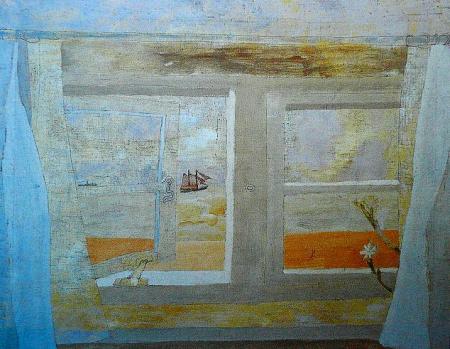
Ben Nicholson
_______________________
Try to Praise the Mutilated World
Adam Zagajewski
Translated By Clare Cavanagh
Try to praise the mutilated world.
Remember June's long days,
and wild strawberries, drops of rosé wine.
The nettles that methodically overgrow
the abandoned homesteads of exiles.
You must praise the mutilated world.
You watched the stylish yachts and ships;
one of them had a long trip ahead of it,
while salty oblivion awaited others.
You've seen the refugees going nowhere,
you've heard the executioners sing joyfully.
You should praise the mutilated world.
Remember the moments when we were together
in a white room and the curtain fluttered.
Return in thought to the concert where music flared.
You gathered acorns in the park in autumn
and leaves eddied over the earth's scars.
Praise the mutilated world
and the gray feather a thrush lost,
and the gentle light that strays and vanishes
and returns.
Enormous Zippers Unfastening: Ten Poems for the End of the World
Nick Ripatrazone the millions
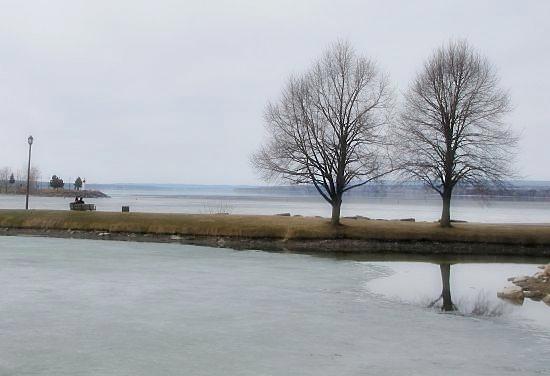
photo - mw
_______________________
Insanity and Ecosophy from Guattari and Bateson to Malabou
and back to Spinoza [pdf]
Rick Dolpijn
(....)
The times certainly seem right, as today, living in what has been called the Antropocene, in
the age in which we slowly begin to understand the grotesque destruction of the Earth by
Man (and its machinery), a radical rethinking of humanity, of Subjectivity, seems most urgent.
Meillassoux is right when he says that the question “what is there?” has been replaced by the
question “what is there for us?” which aptly summarizes the antropomorphic projections
which always already alienate humanity from the living Earth, from the Earth in which and of
which humanity thinks. Empowered by the belief of its own superiority (since modelled after
God) the human all to human the ecological movement today still holds the belief that we
ought to “save the world”, which shows a ridiculously idealist optimism. It once more shows
how dualism has turned thinking into a most particular transcendental Anthropology as
Foucault already said. Malabou is discomfortingly accurate when she analyzes this matter
psychoanalytically;
According to Freud, the ego needs to reassure itself regarding the reality of the outside…
What the subject is assured of is not the presence of that which is excluded, but rather the
exclusion of what is excluded from presence. A phantasmatic or even fantastic, reality of the
remainder object. To say “that does not exist” would originally mean “the existence of this
thing is excluded”.” (2012a: 83).
The fact that we are somehow unable to understand this once again shows us –as Spinoza put it- that man is conscious only of its own desire, of its own endeavours. ...(more)
_______________________
Heureka!
Nobel Lecture
Imre Kertész
November 9, 1929 - March 31, 2016
(....)
... Whereas I, on a lovely spring day in 1955, suddenly came to the realization that there exists only one reality, and that is me, my own life, this fragile gift bestowed for an uncertain time, which had been seized, expropriated by alien forces, and circumscribed, marked up, branded - and which I had to take back from "History", this dreadful Moloch, because it was mine and mine alone, and I had to manage it accordingly.
Needless to say, all this turned me sharply against everything in that world, which, though not objective, was undeniably a reality. I am speaking of Communist Hungary, of "thriving and flourishing" Socialism. If the world is an objective reality that exists independently of us, then humans themselves, even in their own eyes, are nothing more than objects, and their life stories merely a series of disconnected historical accidents, which they may wonder at, but which they themselves have nothing to do with. It would make no sense to arrange the fragments in a coherent whole, because some of it may be far too objective for the subjective Self to be held responsible for it.
A year later, in 1956, the Hungarian Revolution broke out. For a single moment the country turned subjective. Soviet tanks, however, restored objectivity before long.
I do not mean to be facetious. Consider what happened to language in the twentieth century, what became of words. I daresay that the first and most shocking discovery made by writers in our time was that language, in the form it came down to us, a legacy of some primordial culture, had simply become unsuitable to convey concepts and processes that had once been unambiguous and real. Think of Kafka, think of Orwell, in whose hands the old language simply disintegrated. It was as if they were turning it round and round in an open fire, only to display its ashes afterward, in which new and previously unknown patterns emerged.
...(more)
_______________________
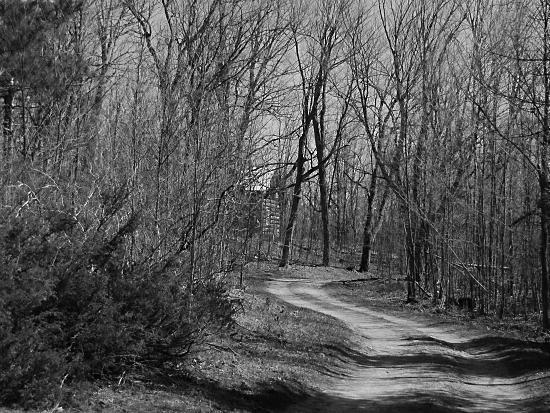
photo - mw
_______________________
Glut Reactions
The Demographics of American Poetry
Mike Chasar
Jed Rasula
boston review
(....)
I have a private theory—a feeling, rather—that the term “poetry” has become, in the age of capitalism, a discursive category into which all things that in one way or another resist or escape complete regulation, rationalization, instrumentalizaton, description, or measure by the logic of the commodity are projected: emotion, magic, uselessness, intimacy, hopes, dreams, love, utopian urges of all sort, beauties, elegances, difficulties, nonsense, mysteries, etc. Thus, the category of poetry is not a continuum from bad to good or amateur to pro like baseball is (where players move from little league to college to the majors) but profoundly heteroglossic—something of a Lower East Side, perhaps, where the value of sentimental worthlessness (cast as “it’s only poetry”) and the value of what you call “the glamour and power of the exception, the unique instance” (cast as “it’s sheer poetry”) both reside. “Poetry” has, as you indicate in your example of Michael Jordan, become a sort of floating signifier in the process—a term to describe those aspects of experience that we don’t have much language for and that capitalist ideology doesn’t want us to have a language for, because it would then call those things into being and make them real and more powerful. Any threat to rational utilitarian discourse—anything that can’t be “read” or completely instrumentalized, ranging from The Alphabet to the sort of obscure beggars’ chants that Daniel Tiffany explores in parts of Infidel Poetics: Riddles, Nightlife, Substance—ends up here as a victim of capitalist damage control: poetry gangs, and the various human experiences that are not satisfied or accounted for by capitalism, turn their spit on each other, and the administrators of capitalism can reach in and select any of these values for strategic use as the occasion requires.
...(more)
via robertogreco
_______________________
Hail the maintainers
Lee Vinsel & Andrew Russell
aeon
Innovation is a dominant ideology of our era, embraced in America by Silicon Valley, Wall Street, and the Washington DC political elite. As the pursuit of innovation has inspired technologists and capitalists, it has also provoked critics who suspect that the peddlers of innovation radically overvalue innovation. What happens after innovation, they argue, is more important. Maintenance and repair, the building of infrastructures, the mundane labour that goes into sustaining functioning and efficient infrastructures, simply has more impact on people’s daily lives than the vast majority of technological innovations.
(....)
The trajectory of ‘innovation’ from core, valued practice to slogan of dystopian societies, is not entirely surprising, at a certain level. There is a formulaic feel: a term gains popularity because it resonates with the zeitgeist, reaches buzzword status, then suffers from overexposure and cooptation. Right now, the formula has brought society to a question: after ‘innovation’ has been exposed as hucksterism, is there a better way to characterise relationships between society and technology?
...(more)
_______________________
Wall and Bulldozer
John Berger
(....)
Under other circumstances in the past, political leaders proposed the active defence of already existing institutions and practices, more or less respected by those they were addressing, and now considered to be threatened and in danger. Such propositions often led to chauvinism, racism and witch-hunting. Yet their rhetoric encouraged and made real, however briefly, a widespread and lived sense of shared loyalties, during the saving of something.
The rhetoric of today's political leaders serves neither construction nor conservation. Its aim is to dismantle. Dismantle what has been inherited from the past, socially, economically and ethically, and, in particular, all the associations, regulations and mechanisms expressing solidarity.
The End of History, which is the Corporate global slogan, is not a prophecy, but an order to wipe out the past and what it has bequeathed everywhere. The market requires every consumer and employee to be massively alone in the present.
...(more) _______________________

photo - mw
_______________________
LOL Nothing Matters: A Defense of the Internet’s Absence of Meaning
Paul Ford
(....)
So those are the sides: You are either a culture person—a reader—or a social media person, someone consuming vast heaps of memes sprayed directly into your sad eyes by giant companies like Facebook and Twitter.
(....)
The most meaningful experiences I have, the experiences that give me the greatest insight into the operation of culture over time—something over which historians used to hold a monopoly—are the results of database queries. I go in, I search for a term, I click some links, and the resulting stream of options is not even a narrative, just a bag of odds and ends. Then I begin a gentle pawing-through. What I like most is to skim through things that were intended to be transient. The ads, the newsy bits from beekeeping journals, the announcements of 1940s automobiles. You could call me an ephemeralist.
(....)
The meaning of reading this way doesn’t land quickly, and sometimes it doesn’t land at all. It is ephemeralism for the purest pleasure of it. There is no ethical lesson, no particular sympathy to be gained for a subject. There’s no moral, no beginning, no ending, and very little tragedy. Only change. On old radio shows you can hear the way that voices sounded, the way vowels sounded; in old magazines you can see lithography take over whole pages that previously had been composed of pure type, and then yield to photographs. You can bathe in a world of type specimens, museum catalogs, comical narratives about aeroplanes, jest-books, and so forth. It is glorious: lovely to read and accessible, subtle, full of mystery, often hilarious.
Books and web sites are both always begging for attention. But that is the best thing about ephemeralism: There isn’t a marketing message, nothing that you must read. There’s just an endless collection of stuff, its urgency long-fed. Ephemeralist reading is halfway between the collective pleasures of a social network and the solitary ones of a book. You just drift, occasionally sharing, not creating meaning and not worrying about any of it.
The lesson of that kind of reading is a simple one. It has taught me that my own life is ephemeral. ...(more)

Enfant à la cage
1949
Antonio Clavé
b. April 5, 1913
_______________________
Three Poems
John Ashbery
Text Trek
If you say so, "boss," I'll retract my statement.
Only I wouldn't be so radiant if I was you.
The ripple effect, strength in deterioration,
has expanded on more than a handful.
Have a good time,
just get out of the hurricane entrance. I'll see you
there on all fives, explains Lucy.
A face named Al remarked on the long destiny
between veils, where nobody noodles too long
anyway. Less remarked on is the mask-laden buffet.
Angels wash their faces. Lady Godiva for one.
Leave some room for the astonishingly mild
ripple-effect milkweed fence. And say, once that has
lapsed, go on a trip right now. Don't we have to register?
A slow branch is to be beheaded. Old trash,
what somebody said half a million times,
chimes farther down in the seat.
Unhouse the birds. Make your time over there
a ribald heraldry of number-coaching animals,
better early than never. Why, I thought so.
I was right about the comet
and the cement plant fluke, subway Grandma. ...(more)
BOMB 135, Spring 2016
_______________________
talking to the dead
Bruce Bromley
3am
(....)
In the current American climate, while Donald Trump lunges for the White House by ranting from platforms, screens, and newsfeeds against the women, the immigrants, the refugees who must be identical with his contempt for their differences from him, as if a word matched its referent, always without slippage, I talk to the dead. To two long gone, especially: to Virginia Woolf and Plato, their resonances stretched across the millennia separating them. They are tough to hear, those echoes, but the listening can be earned, so long as any hearer balks at the sameness that lives on the other side of Trump’s disdain for the differential. Part of our human trade, as Levi sketches out, ought to involve defying the effort to squeeze persons into our vision of them, to batter down two into one, whether or not we are mindful of the consequences of such an act, its potential explosions. Together, Woolf and Plato help their listeners to resist equalizing the seer and the seen, or at least to understand that the consequences of resistance, as well as its failure, are ours.
I remember that a great deal revolves around how we, her readers, think out the principle of connectedness so preponderant in Woolf’s “A Sketch of the Past.” To determine that we live “all the time in relation” to constitutional “rods,” “conceptions,” to a “pattern” lurking “behind the cotton wool” of our experience of the given is not to decide that what lies beneath triumphs, strangely, over what stands upon it. Encoding the former and the latter in visual vocabulary, Woolf allows for our inference that perhaps both emerge from interdependent derivations. But when she asserts that “one” is “not confined to one’s body,” to “what one says and does,” Woolf fails to produce the consequence that the individual’s approach to that which fortifies the visible may be described as straightforward, effortless, tranquil. Since “shock” beckons the seeing of connectedness, to see well is to abide by the pricking pain that enhances what the eye can take. To register that twinge, that enhancement, necessitates a body whose commitment to unstinting vision will affect its conduct inside the “cotton wool” bequeathed to it from birth and within the “pattern” behind that bequest, a correlation accentuated by how Woolf’s representative language pleaches together the two nominal phrases as visualizing systems. With linguistic precision, Woolf settles that, for all of us, a wakened access to any spatiality is never direct, never unmitigated, never of limitless duration. And her prepositions throughout her description of that problem, in concert with the nouns they govern, with the verbs whose relational qualities they nuance, steer us towards the variety of connection she judges at once meritorious and real. Whether or not we struggle to perceive with adequate limpidity, so much intervenes between ourselves and the nucleus of our attention: the past as it bridges the present; how we orient ourselves in the direction of the moment; the personhoods evolved across both time-divisions—these collect in interposition while we entrust ourselves to the perceptual act. If a “pattern” conceals itself behind the “cotton wool” of daily “non-being,” of habitual inattentiveness, to arrive at one, we must pass through the other, and we will carry with us the content of that passing as we embark on our journey, though to stay in the state of arrival demands a concentrated experience of time to which our attentive skills can only be unequal. Yet in what way does Woolf’s vaunted “we,” multiply present throughout this material, express the connectedness that she surrenders to us?
...(more)
_______________________
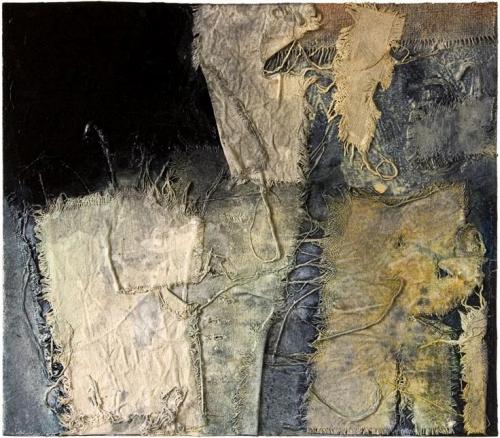
Christopher Wood
April 7, 1901 - August 21, 1930
_______________________
Does poetry make us human?
From "The Hatred of Poetry"
Ben Lerner
(....)
If you are an adult foolish enough to tell another adult that you are (still!) a poet, they will often describe for you their falling away from poetry: I wrote it in high school; I dabbled in college. Almost never do they write it now. They will tell you they have a niece or nephew who writes poetry. These familiar encounters — my most recent was at the dentist, my mouth propped open while Dr. X almost gagged me with a mirror, as if searching for my innermost feelings — have a tone that’s difficult to describe. There is embarrassment for the poet — couldn’t you get a real job and put your childish ways behind you? — but there is also embarrassment on the part of the non-poet because having to acknowledge one’s total alienation from poetry chafes against the early association of poem and self. The ghost of that romantic conjunction makes the falling away from poetry a falling away from the pure potentiality of being human into the vicissitudes of being an actual person in a concrete historical situation, your hands in my mouth. I had the sensation that Dr. X, as he knocked the little mirror against my molars, was contemptuous of the idea that genuine poetry could issue from such an opening. And Dr. X was right: there is no genuine poetry; there is only, after all, and at best, a place for it.
The awkward and even tense exchange between a poet and non-poet — they often happen on an airplane or in a doctor’s office or some other contemporary no-place — is a little interpersonal breach that reveals how inextricable “poetry” is from our imagination of social life. Whatever we think of particular poems, “poetry” is a word for the meeting place of the private and the public, the internal and the external; my capacity to express myself poetically and to comprehend such expressions is a fundamental qualification for social recognition. If I have no interest in poetry or if I feel repelled by actual poems, either I am failing the social or the social is failing me. I don’t mean that Dr. X or whoever thinks in these terms, or that these assumptions about poetry are present for everyone or in the same degree, or that this is the only or best way of thinking about poetry, but I am convinced that the embarrassment or suspicion or anger that is often palpable in such meetings derives from this sense of poetry’s tremendous social stakes (combined with a sense of its tremendous social marginalization). And it’s these stakes which make actual poems an offense: if my seatmate in a holding pattern over Denver calls on me to sing, demands a poem from me that will unite coach and first class in one community, I can’t do it. Maybe this is because I don’t know how to sing or because the passengers don’t know how to listen, but it might also be because “poetry” denotes an impossible demand. This is one underlying reason why poetry is so often met with contempt rather than mere indifference and why it is periodically denounced as opposed to simply dismissed: most of us carry at least a weak sense of a correlation between poetry and human possibility that cannot be realized by poems. The poet by his very claim to be a maker of poems is therefore both an embarrassment and accusation.
...(more)
_______________________
Gathering: Digital and Natural Ecologies
Collected by Lisa Swanstrom
electronic book review
The Peripheral Future
Lisa Swanstrom
(....)
This special gathering of ebr aims to re-frame this issue in two important ways. It does so firstly by refusing to indulge in post-apocalyptic speculation. And secondly, in contrast to the large-scale rhetoric that associates technology—all of it, but particularly digital technology—with the “End Times,” it seeks to examine the ways that digital technology is, already, participating in environmental discourse, neither as an agent of ecological devastation nor a figure of salvation. Instead, the essays in this special gathering demonstrate the ways that the digital is always already overlaid with the environment and interwoven with environmental aesthetics.
(....)
The works of digital art that this gathering attends to move beyond the desire for medial transparency and aim instead for visibility. They include video games, works of interactive fiction, viral poetry, data visualizations, and algorithmic art interventions, all of which foreground the digital in its relation to the vulnerable natural spaces that each work expresses: Superfund sites, areas of viral transmission, polluted landscapes in the process of recovery or environmental remediation, and ancient and intricate subterranean cave systems. To be clear, however, these are not utopian projects that hold up the digital as an example of some kind of saving or emancipatory power. Instead, they make visible the relations between the digital and the natural in order to grapple with they way they are complexly intertwined. It would be grossly naïve to hold up digital technology in such utopian terms, especially given the contemporary vulnerability and global turbulence of so many natural systems. But by excluding digital art and technology from an otherwise urgent and complex discussion, we do little more than add digital detritus to an ever-growing junk heap within ecocritical discourse, an ironic complement to the real-world digital dumps that haunt contemporary landscapes and that so urgently require attention.
...(more)
_______________________
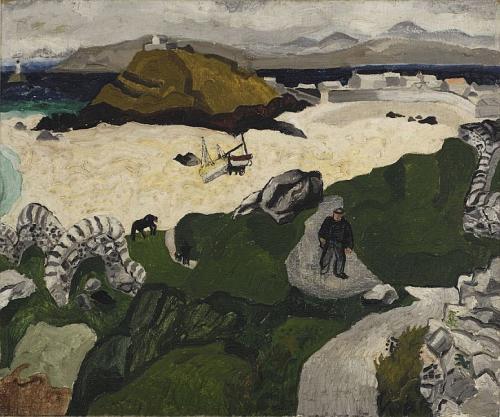
Porthmeor Beach
Christopher Wood
1928
_______________________
Method without Methodology: Data and the Digital Humanities
Lindsay Caplan
In that Empire, the Art of Cartography attained such Perfection that the map of a single Province occupied the entirety of a City, and the map of the Empire, the entirety of a Province. In time, those Unconscionable Maps no longer satisfied, and the Cartographers Guilds struck a Map of the Empire whose size was that of the Empire, and which coincided point for point with it. The following Generations, who were not so fond of the Study of Cartography as their Forebears had been, saw that that vast map was Useless, and not without some Pitilessness was it, that they delivered it up to the Inclemencies of Sun and Winters. In the Deserts of the West, still today, there are Tattered Ruins of that Map, inhabited by Animals and Beggars; in all the Land there is no other Relic of the Disciplines of Geography.
—Suárez Miranda, Viajes de varones prudentes, Libro IV, Cap. XLV, Lérida, 1658
In this one-paragraph short story by Jorge Luis Borges, “On the Exactitude of Science” (1946), the fictional Suárez Miranda recounts the rise and fall of an imperial project to make a map the same size as the territory it describes. As soon as the awkwardly scaled artifact is complete, however, its prospective users recognize its absurd inadequacy and abandon it to be absorbed back into the ground it was intended to figure.
Borges’s image of these threadbare vestiges—the reference to which became something of a postmodern proverb in the second half of the twentieth century—stands as a warning against confusing a thing with its representation. The results are more than impractical; they are dangerously fantastical. It is a fantasy to think we can stand apart from reality and grasp it with the proper, total prosthetic. There is no ontological outside from which our vantage is secure and sacrosanct. Nevertheless, there is today a renewed attempt to conflate the map and the territory. From the NSA’s deliberate stockpiling of data and Google’s relentless collection of incidental personal archives like old emails, Facebook posts, and website cookies, “Big Data” is information amassed to the point of incalculability. Not quite map and not quite territory, these archives are as vast and unwieldy as the phenomena they seek to chart and define.
...(more)
e-flux journal issue 72
_______________________
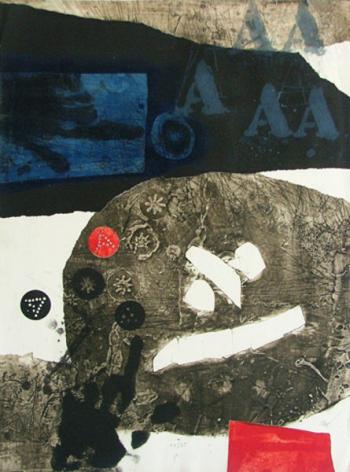
Nani Le Guerrier
Antonio Clavé
_______________________
Words without Borders April 2016: Women Write War
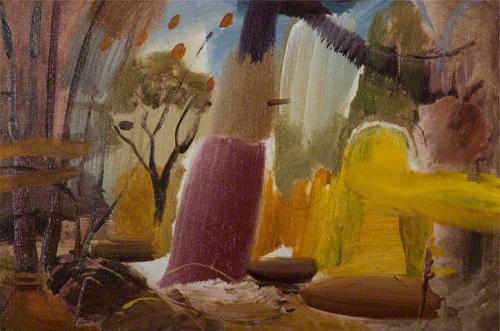
Woodpecker Tree
Ivon Hitchens
1893-1979
_______________________
Inside Out
Jean-Luc Nancy
Translated by Michael Marder
The Body Is Nothing but the outside: skin exposed, a network of sentient receivers and transmitters. All outside and nothing like “me” that would be held inside that wrapping. There is no ghost in the machine, no dimensionless point where “I” feel or feel myself feeling. The inside of the envelope is yet another outside, developed (or de-enveloped) otherwise, full of folds, turns, convolutions, and adhesions. Full of invaginations, small heaps, and conglomerations.
It senses just because everything touches it throughout its continuous thickness. Everything is touched and mixed; everything slides into the silence of the organs that provide neither sights nor tastes nor smells nor sounds, but only touch, because the outside is so constant, so thick, so caught up in a compact and solidary mass that the interior body is without organs. Being outside myself as this inside, prohibiting penetration (except by disemboweling or suffocating me), the outside is indefinitely wrapped, absorbed, sunk in its own magma, both fitting it so well and absolutely foreign to that which this magma fills, to that which it sustains and animates, to all this skin exposed with its orifices, mucosa, pores, and hair, all its contacts and communication, all the vibrations of the world, of matter and images, of timbers and resonances, all these gases and squirts, these air currents, these mirrors, these pieces of metal, these other skins, these words, these impressions, depressions, and expressions.
Everything the outside-within sustains with its buttresses, columns, cages, tubes, and membranes, however, also makes an impression on it. ......(more)
The Philosophical Salon
an LA review of books channel
_______________________
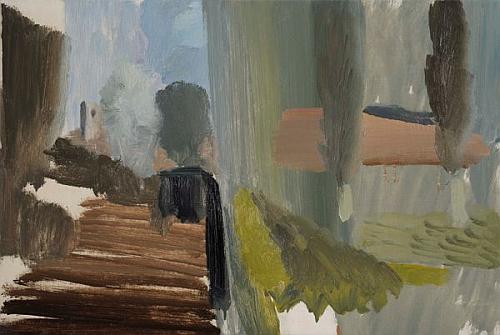
Iping Church
Ivon Hitchens
_______________________
The Theology of Consumerism
Sean J. McGrath
Attitudes towards daily life, towards governance and trade, work and love, are always grounded in layers of historically conditioned, ethical, metaphysical, and theological assumption. It might be the hallmark of the modern to routinely forget how much of what we regard as freely expressive of our unique perspective on things is indebted to the past. The nearest layer to the surface may be consciously appropriated or rejected, but as we descend, the degree of availability of what R.G. Collingwood called “absolute presuppositions” to ethical and philosophical reflection decreases. Our beliefs are never entirely available for rationalization, but owe more to history than we are generally inclined to acknowledge.
...(more)
Analecta Hermeneutica
Vol 6 (2014)
_______________________
My John Berryman: A Poet of Deep Unease
Henri Cole
newyorker
... Perhaps it is the strange combination of decorum and distress that I love most, or, to put it another way, the volatile mix of tenderness and unease. And I love that the dream songs are not tidy little poems following each other tidily into silence, like so many poems published today.
(....)
Some readers have wondered if these uncomfortable poems were the result of alcoholism, or of double doses of chlorpromazine (an antipsychotic) or Dilantin (an anticonvulsant), which had both been prescribed to Berryman. But I do not really care, since beneath the gruff surface and the high jinks of these poems we hear, deeper down, a vibrant, loving man with a vast spirit. Exacerbated and enormously learned, Berryman was a master of the poem written with manic energy from the edges of human experience. Now, a half-century later, the dream songs remain a delicious, horrible, grotesque, ridiculous, fragmentary, tortured, diary-like transcription of a life in which a man worked hard, got up early each day to work at his desk and assemble language into art, strived to love his young wife and children, taught his classes, lectured, wrote letters of recommendation, mentored his students, and fulfilled the obligations that come with being a lonely man of letters living in the Midwest. Envy doesn’t appear to have been one of Berryman’s afflictions. But he was a poet of deep unease, and in this unease he longed for stillness, silence, and the peace of lying down.
...(more)
_______________________
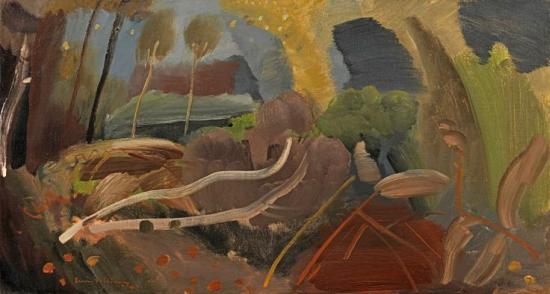
Ivon Hitchens
_______________________
Jane Austen meets the GPS: Place and Space
David Kolb
(....)
The places in Austen’s novels are gathered around a home with a distinctive history and qualities. The home is connected to other qualitatively individual houses, and to well-known fields, markets and ballrooms. This net of connections is measured by bodily modes of travel: by how long it takes to walk or ride there, and by whether the journey is fatiguing or not. Local travel uses familiar local landmarks, concretely described: this hill, that field, that park and estate. This locality has a privileged physical center, and a network of “places” in a strong sense of that word, which contrast with more abstract spaces and connections today.
New Networks
For in our time there are new nets cast over our world, nets which are in principle un-centered and disembodied. Trade and the flow of finance are becoming uprooted from privileged centers. The Internet connects places and data without a central hub. Its pattern is rhizomatic, with no taproot. As an example of such a pervasive decentered and abstract network I will discuss the Global Positioning System.
(....)
Space and Place
The network of places described in Austen’s novels stands in contrast to this other more abstract network. Such a contrast has been described as that between places and spaces. In phenomenological circles, this distinction between place and space has been an ongoing topic of discussion (see, for instance, Malpas 2007). For my purposes I can briefly summarize the distinction as follows:
Places are inherently bodily and perspectival. Place exists only as lived. A place starts from an animate body and is perceived as extending in directions keyed to bodily axes (up, down, forward, backward, right, left) and potential bodily movements. Furthermore, a place is composed of qualitative regions which are unique, and which relate to the human body and its activities. This is not to say that places lack social coding and histories; indeed, part of what makes a place is the mapping of human activities and norms on to the highly detailed qualitative textures of place as they extend and penetrate one another (see Kolb 2008). Places are not all cozy and homelike; they can be threatening or strange. But they remain linked to bodily movements, social meanings, and the details of the concrete landscape. They have individual histories and emotional resonances.
Spaces, on the other hand, are geometrical expanses. They can be measured with coordinates to locate items and distinguish subspaces, but those coordinate systems do not depend on local details, and the coordinate systems may be multiple, and can be transformed one into another. Measured regions have only arbitrary or pragmatic boundaries, not natural landmarks and centers. Qualitative distinctions among locations and regions count for little. Space is the object of a view from nowhere, or anywhere. Space in this sense pre-exists our bodily presence and locates it on an abstract grid.
We do not live on an abstract grid, but to a surprising degree we can treat places as if we did. We can “level the site,” destroying its native contours, and build on it in ways indifferent to the local context. Or we can by bland repetition make distant sites “the same.” Or we can create areas and buildings whose uses and social norms pressure us to adopt only very thin social roles: shoppers in supermarkets and malls, drivers on highways, passengers at airports, abstracting from our own individuality and history. Such places do not reinforce the rich historical identity and thick norms found in traditional places such as Jane Austen’s homes.
The GPS performs a related but more extreme abstraction. One always can know where one is with reference to a global grid, without knowing where that where is, in concrete and social terms. ...(more)
S.Ph. Essays and Explorations
Volume 1, Issue 1, Spring-Summer 2016
_______________________
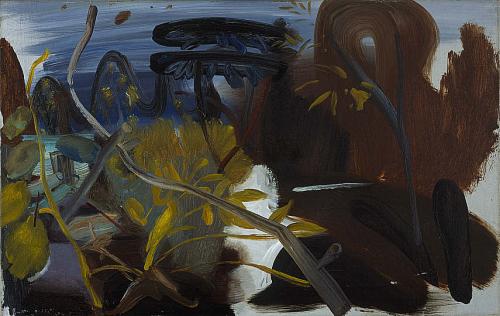
Tangled Pool, No. 10
Ivon Hitchens
_______________________
Seven poems
Habib Tengour
translated by Pierre Joris
CAESURA – V.
There’s nothing. Renew the experience? The pain loses all materiality. At the moment of breaking camp, the heart grows heavy. The eye contracts. An empty horizon.
That’s no problem! The pleasures of the body are not futile. They illuminate the soul like the lamp of the hermit…
On the Euphrates, the winds are raging to remind you of the terror of a sacred night and the glare of your escapades.
The evocation suggests a few veiled images storming an uncertain memory. Patiently you put the words in charge of subverting the weft of the poem to transmit a breath. No matter that wild beasts do not leave their lairs to keep you company.
...(more)
|
























